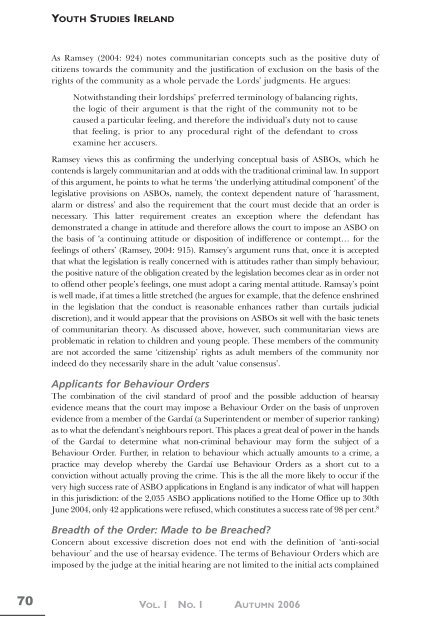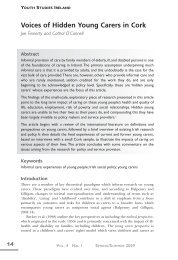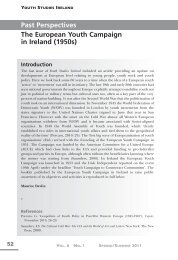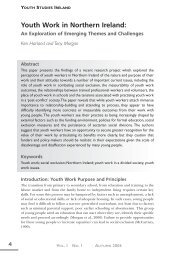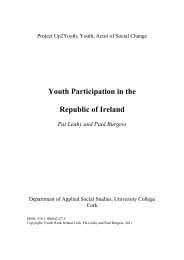Download full edition - Youth Work Ireland
Download full edition - Youth Work Ireland
Download full edition - Youth Work Ireland
You also want an ePaper? Increase the reach of your titles
YUMPU automatically turns print PDFs into web optimized ePapers that Google loves.
YOUTH STUDIES IRELANDAs Ramsey (2004: 924) notes communitarian concepts such as the positive duty ofcitizens towards the community and the justification of exclusion on the basis of therights of the community as a whole pervade the Lords’ judgments. He argues:Notwithstanding their lordships’ preferred terminology of balancing rights,the logic of their argument is that the right of the community not to becaused a particular feeling, and therefore the individual’s duty not to causethat feeling, is prior to any procedural right of the defendant to crossexamine her accusers.Ramsey views this as confirming the underlying conceptual basis of ASBOs, which hecontends is largely communitarian and at odds with the traditional criminal law. In supportof this argument, he points to what he terms ‘the underlying attitudinal component’ of thelegislative provisions on ASBOs, namely, the context dependent nature of ‘harassment,alarm or distress’ and also the requirement that the court must decide that an order isnecessary. This latter requirement creates an exception where the defendant hasdemonstrated a change in attitude and therefore allows the court to impose an ASBO onthe basis of ‘a continuing attitude or disposition of indifference or contempt… for thefeelings of others’ (Ramsey, 2004: 915). Ramsey’s argument runs that, once it is acceptedthat what the legislation is really concerned with is attitudes rather than simply behaviour,the positive nature of the obligation created by the legislation becomes clear as in order notto offend other people’s feelings, one must adopt a caring mental attitude. Ramsay’s pointis well made, if at times a little stretched (he argues for example, that the defence enshrinedin the legislation that the conduct is reasonable enhances rather than curtails judicialdiscretion), and it would appear that the provisions on ASBOs sit well with the basic tenetsof communitarian theory. As discussed above, however, such communitarian views areproblematic in relation to children and young people. These members of the communityare not accorded the same ‘citizenship’ rights as adult members of the community norindeed do they necessarily share in the adult ‘value consensus’.Applicants for Behaviour OrdersThe combination of the civil standard of proof and the possible adduction of hearsayevidence means that the court may impose a Behaviour Order on the basis of unprovenevidence from a member of the Gardaí (a Superintendent or member of superior ranking)as to what the defendant’s neighbours report. This places a great deal of power in the handsof the Gardaí to determine what non-criminal behaviour may form the subject of aBehaviour Order. Further, in relation to behaviour which actually amounts to a crime, apractice may develop whereby the Gardaí use Behaviour Orders as a short cut to aconviction without actually proving the crime. This is the all the more likely to occur if thevery high success rate of ASBO applications in England is any indicator of what will happenin this jurisdiction: of the 2,035 ASBO applications notified to the Home Office up to 30thJune 2004, only 42 applications were refused, which constitutes a success rate of 98 per cent. 8Breadth of the Order: Made to be Breached?Concern about excessive discretion does not end with the definition of ‘anti-socialbehaviour’ and the use of hearsay evidence. The terms of Behaviour Orders which areimposed by the judge at the initial hearing are not limited to the initial acts complained70 VOL. 1 NO. 1 AUTUMN 2006


